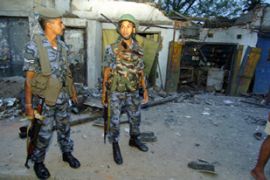Fierce clashes in north Sri Lanka
Fighting leaves scores dead after Tamil Tigers reportedly attack army bases.

Heavy fighting
The defence ministry said heavy fighting raged in the area, but claimed that the military had beaten back an LTTE offensive by killing at least 52 Tiger fighters.
| On the scene | ||
Al Jazeera’s Tony Birtley gets exclusive access to the heart of the conflict in the east of Sri Lanka |
Neither sides’ claims can be verified but the Tigers said they were planning to return the dead bodies of 16 government soldiers through the International Committee of the Red Cross.
Rasiah Ilanthiriyan, a Tiger spokesman, said that LTTE fighters had established a forward defence line in areas previously held by the military following the commando-style attack which began on Saturday night.
Sporadic artillery exchanges continued in Vavuniya district, which borders LTTE territory, the military and Tigers said on Sunday.
Residents and officials said they had heard heavy shelling since Saturday night.
Charity workers killed
Also on Sunday, two Red Cross workers were found shot dead in central Sri Lanka, a day after they were abducted by men claiming to be from the police, the charity said.
| Conflict in Sri Lanka |
|
Tamil minority make up 12 per cent of island’s 20m population They complain of discrimination from strengthening Sinhalese nationalism Decades of protest erupted into civil war in 1983
Up to 70,000 have died in fighting, both sides accused of atrocities
Ceasefire in 2002 led to period of relative peace
Rebel attacks surged in late 2005, intensified fighting since and renewed calls for Tamil state |
The defence ministry said an investigation was under way into the worst attack against aid workers since the August massacre of 17 local employees of Action Against Hunger, a French charity.
More than 700 people are reported missing in Sri Lanka in the past year and international rights groups have asked the government to end a culture of “impunity” and punish those responsible for extrajudicial killings.
Earlier on Sunday, Sri Lanka’s foreign minister said the government will keep its ceasefire pact with the Tamil Tigers, despite a government spokesman’s comments that the “flawed” ceasefire could be scrapped within weeks.
Rohitha Bogollagama, said: “I categorically state that there is no decision taken to abrogate the CFA [ceasefire agreement].
“We have always been encouraging them [the Tigers] to come for talks, and [the] likelihood is that talks will emerge soon.
“If they can come for talks as early as this month, we will be happy, but we leave it for the LTTE to respond.”
Japan’s peace bid
Against this backdrop of escalating tensions, officials and diplomats said Yasushi Akashi, Japan‘s special peace envoy to Sri Lanka, is due to head to the conflict zone on a four-day visit beginning on Tuesday.
They said Akashi was hoping to jump-start the moribund peace process.
The envoy, seen as a key figure, in 2003 helped to raise $4.5bn in pledges to support a Norwegian-backed bid to resolve the conflict.
Mahinda Rajapakse, the Sri Lankan president, said on Friday he was willing to resume talks with the Tigers.

